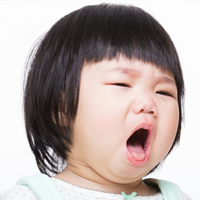Childhood Cough
Coughing is a common occurrence in children and is usually caused by a virus such as the cold or influenza. It is often accompanied by other symptoms such as a fever, runny nose, and sore throat. Your child’s coughing is a reflex action as his body tries to expel mucus and phlegm from the windpipe, helping them breathe easier.
Looking out for certain characteristics can help decode the cause of your child’s cough and help you work out subsequent action.
Looking out for certain characteristics can help decode the cause of your child’s cough and help you work out subsequent action.

Types of Cough
- Dry hacking cough
Usually caused by an upper respiratory tract infection such as the cold or flu. Dry coughing may also spell an onset of other lower respiratory tract conditions such as asthma, bronchitis or pneumonia. Being exposed to pollutants such as smoke or dust may also trigger a dry cough in children with a sensitive airway. - Wet phlegmy cough
Occurs when fluid and mucus is secreted in the lower respiratory tract (windpipe and lungs), possibly due to infection. Coughing with phlegm helps removes this fluid from the body. A cough may also sound wet due to mucus which has accumulated at the back of the throat. - Wheezy cough
Occurs when there is a high pitched wheeze or whistling sound when the child is exhaling. It can happen when the lower airway is blocked, as with childhood conditions such as asthma or bronchitis. - Barking cough (Croup)
An upper respiratory infection which typically occurs in children below the age of 5. Children with croup will cough with a barking sound due to an inflamed upper windpipe and produce a high-pitched whistling sound when inhaling. Your paediatrician can easily diagnose croup through observation and a throat examination. Fortunately, most cases can be treated at home. However, in severe cases, the child can be quite distressed and urgent medical attention may be needed. - Whooping cough (Pertussis)
A contagious bacterial infection in the nose and throat which displays similar symptoms to the common cold. The cough gradually worsens and your child may experience coughing fits consisting of 5 to 15 continuous coughs followed by a “whooping” sound as he tries to inhale. While serious in young children, whooping cough can be easily prevented with the routine TDap vaccine. Adult caregivers are also advised to get vaccinated to prevent spread to their wards.
When do I Seek Medical Attention?
If you are concerned your little one’s coughing may be a sign of something more serious, check for other symptoms that may indicate complications. Seek medical help if you observe any of the following:
If you feel that your child’s cough does not warrant medical attention, you can try simple home-based treatments such as turning on a cool-mist humidifier and administering suitable over-the- counter cough medication to help ease throat irritation. Parents should also ensure their child has plenty of water to drink and gets enough rest to help him or her fight the virus and build up immunity levels.
- Difficulty breathing (i.e. wheezing, panting, noisy breathing)
- Chest pains when breathing, in an older child
- Drooling or trouble swallowing
- Coughing up blood
- Child appears distressed and has persistent crying
- Persistent high fever (especially if your infant is less than 3 months)
- Persistent vomiting associated with coughing
- Depressions below the rib cage when breathing. This may indicate the child is breathless
- Change in colour or sensorium in the child
- In an older child, inability to speak in full sentences also may indicate breathlessness
If you feel that your child’s cough does not warrant medical attention, you can try simple home-based treatments such as turning on a cool-mist humidifier and administering suitable over-the- counter cough medication to help ease throat irritation. Parents should also ensure their child has plenty of water to drink and gets enough rest to help him or her fight the virus and build up immunity levels.

